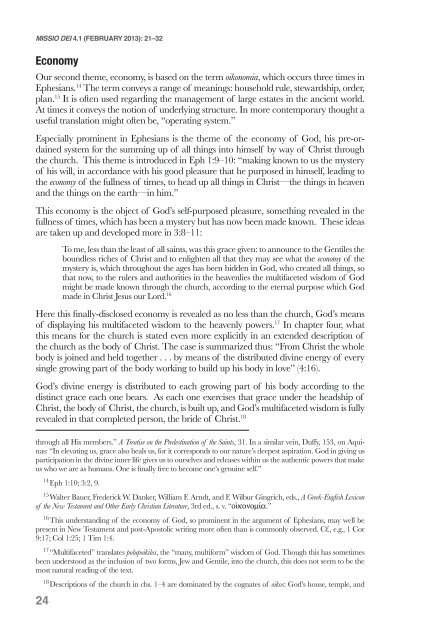VULNERABLE MISSION
VULNERABLE MISSION
VULNERABLE MISSION
You also want an ePaper? Increase the reach of your titles
YUMPU automatically turns print PDFs into web optimized ePapers that Google loves.
MISSIO DEI 4.1 (FEBRUARY 2013): 21–32<br />
Economy<br />
Our second theme, economy, is based on the term oikonomia, which occurs three times in<br />
Ephesians. 14 The term conveys a range of meanings: household rule, stewardship, order,<br />
plan. 15 It is often used regarding the management of large estates in the ancient world.<br />
At times it conveys the notion of underlying structure. In more contemporary thought a<br />
useful translation might often be, “operating system.”<br />
Especially prominent in Ephesians is the theme of the economy of God, his pre-ordained<br />
system for the summing up of all things into himself by way of Christ through<br />
the church. This theme is introduced in Eph 1:9–10: “making known to us the mystery<br />
of his will, in accordance with his good pleasure that he purposed in himself, leading to<br />
the economy of the fullness of times, to head up all things in Christ—the things in heaven<br />
and the things on the earth—in him.”<br />
This economy is the object of God’s self-purposed pleasure, something revealed in the<br />
fullness of times, which has been a mystery but has now been made known. These ideas<br />
are taken up and developed more in 3:8–11:<br />
24<br />
To me, less than the least of all saints, was this grace given: to announce to the Gentiles the<br />
boundless riches of Christ and to enlighten all that they may see what the economy of the<br />
mystery is, which throughout the ages has been hidden in God, who created all things, so<br />
that now, to the rulers and authorities in the heavenlies the multifaceted wisdom of God<br />
might be made known through the church, according to the eternal purpose which God<br />
made in Christ Jesus our Lord. 16<br />
Here this finally-disclosed economy is revealed as no less than the church, God’s means<br />
of displaying his multifaceted wisdom to the heavenly powers. 17 In chapter four, what<br />
this means for the church is stated even more explicitly in an extended description of<br />
the church as the body of Christ. The case is summarized thus: “From Christ the whole<br />
body is joined and held together . . . by means of the distributed divine energy of every<br />
single growing part of the body working to build up his body in love” (4:16).<br />
God’s divine energy is distributed to each growing part of his body according to the<br />
distinct grace each one bears. As each one exercises that grace under the headship of<br />
Christ, the body of Christ, the church, is built up, and God’s multifaceted wisdom is fully<br />
revealed in that completed person, the bride of Christ. 18<br />
through all His members.” A Treatise on the Predestination of the Saints, 31. In a similar vein, Duffy, 153, on Aquinas:<br />
“In elevating us, grace also heals us, for it corresponds to our nature’s deepest aspiration. God in giving us<br />
participation in the divine inner life gives us to ourselves and releases within us the authentic powers that make<br />
us who we are as humans. One is finally free to become one’s genuine self.”<br />
14 Eph 1:10; 3:2, 9.<br />
15 Walter Bauer, Frederick W. Danker, William F. Arndt, and F. Wilbur Gingrich, eds., A Greek-English Lexicon<br />
of the New Testament and Other Early Christian Literature, 3rd ed., s. v. “oi˙konomi÷a.”<br />
16 This understanding of the economy of God, so prominent in the argument of Ephesians, may well be<br />
present in New Testament and post-Apostolic writing more often than is commonly observed. Cf., e.g., 1 Cor<br />
9:17; Col 1:25; 1 Tim 1:4.<br />
17 “Multifaceted” translates polupoikilos, the “many, multiform” wisdom of God. Though this has sometimes<br />
been understood as the inclusion of two forms, Jew and Gentile, into the church, this does not seem to be the<br />
most natural reading of the text.<br />
18 Descriptions of the church in chs. 1–4 are dominated by the cognates of oikos: God’s house, temple, and


